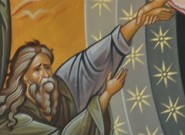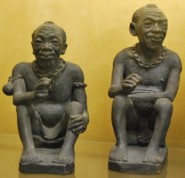[ad_1]

… concerning your former conduct, the old man which grows corrupt according to the deceitful lusts, and be renewed in the spirit of your mind, and that you put on the new man which was created according to God, in true righteousness and holiness. (Ephesians 4:22-24)
The New Testament gives a name to self which is a slave to sin: “the old man.” The “old man” is in every human being whether male, female or child. It is not us as we mature and get old. Rather, it is the person we are before we are renewed in Christ, a person ruled by the ‘world’ rather than by God’s Spirit. The “old man” within us is the one against whom we are to direct our spiritual warfare.

At the baptism service we pray to be regenerated by “water and the spirit” – born again. Jesus said: “Truly, truly, I say to you, unless one is born of water and the Spirit, he cannot enter the kingdom of God. That which is born of the flesh is flesh, and that which is born of the Spirit is spirit. Do not marvel that I said to you, ‘You must be born anew‘” (John 3:5-7). In baptism we are given a new birth, a regeneration. One of the prayers from the baptismal service says:
You have bestowed upon us regeneration from on high by water and the spirit. Manifest Yourself, O Lord, in this water, and grant that he (she) that is to be baptized may be transformed therein to the putting away of the old man, which is corrupt according to the deceitful lusts, and to the putting on of the new, which is renewed according to the Image of Him that created him (her).

Being born again does not mean that we become a baby again, but rather that we put off our “old man” and are transformed into a “new man.” We put on Christ and in so doing we are made a new creation. What was warped in us by the old man, is healed and we become capable of having the Holy Spirit abide in us again. We become human as God intended for us from the beginning.
A story from the desert fathers reveals how deeply embedded the “old man” is in us. The monastery priest realizes that some of the monks were still living as if in the world, not renewed by Christ but pursuing the pleasures of life:
The priest at Pelusium, once heard that some brothers were often in the city, taking baths and neglecting themselves. He came to the synaxis and took their habits away from them; but subsequently his heart struck him and he repented. Intoxicated with his logismoi he came to Abba Poemen carrying the brothers’ albs and reported the matter to the elder.

[The priest is crestfallen that his fellow monks enjoy the world more than they love the spiritual life of the monastery. He collects their monastic habits (robes) which they apparently had discarded in the monastery in order to go to the public baths and enjoy themselves. But then he himself repents of having judged his brothers and he seeks out St Poemen to see what the Abba would advise. The priest realizes his own thoughts are just as worldly as that of his fellow monks even if he isn’t succumbing to their same temptations.]

The elder said to him: ‘Do you yourself not have anything of the old man in you? Have you put him off?’ The priest said: ‘I have my share of the old man.’ The elder said to him: ‘So you see, you too are like the brothers, for if you share even a little bit of the oldness, you are in subjection to sin just the same.’ The priest then went off, called the brothers, apologized to the eleven of them, clothed them with the monastic habit and dismissed them. (GIVE ME A WORD, p 229)

The story reminds us that despite our repentance and baptism – our putting off the old man and putting on Christ – the old man can still be influencing our hearts and minds. So rather than judging others for there every fault, we should instead learn from the failings of others that we too are influenced by the “old man”, by sin and temptation. There is a spiritual warfare which every Christian must fight. It is a fight with their own hearts and minds, frailties and failures, temptations and sins. We are to wrestle against our inner “old man” in order to remain united to the triumphant Christ (see St Paul’s description of his struggle with his “old man” in Romans 7:14-25).


